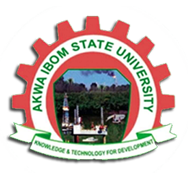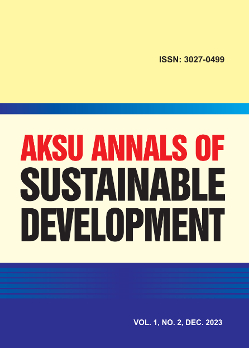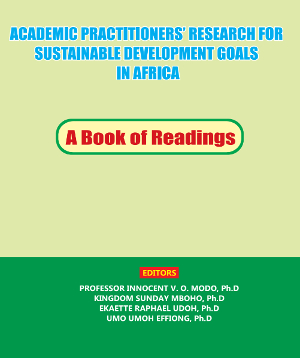EFFECTS OF GENDER INEQUALITY ON GIRL-CHILD EDUCATION IN AKWA IBOM NORTH-WEST SENATORIAL DISTRICT
DOI:
https://doi.org/10.60787/AASD-v1i2-22Keywords:
Gender Inequality, Girl- Child, Education, Akwa Ibom North-West Senatorial DistrictAbstract
Education empowers global citizens for sustainable development to transform societal visions into reality. Unfortunately, the high level of gender disparity of women education in Akwa Ibom North-West Senatorial District in primary and secondary schools is worrisome. This study examined the effects of gender inequality on women education and early marriage on the girl-child education in Akwa Ibom North-West Senatorial District. Radical and Liberal Feminist schools of thought on gender inequality and women education was adopted and used as theoretical perspectives for the study. Descriptive survey method was adopted in gathering data from primary and secondary sources. The findings revealed that early marriage has a great effect on the education of the girl-child in Akwa Ibom North-West Senatorial District. The study recommends that the girl-child education’s sensitization should be intensified and Akwa Ibom State Government should assist parents who are low income earners through skill acquisition empowerment courses to augment their current means of income.
Downloads
References
Abdulazeez, M. (2004). Women education: problems and challenges. Journal of Women in Colleges of Education, 8, 14-17.
Agha, E., Ukommi, A., Ekpenyong, O. & Effiong, U.(2020). Establishing the nexus between technical education and industrial development in Nigeria. Journal of Research in Education and Society,11(1),38-56.
Alibi, T. and Alabi, O.(2012).Child labour amongst urban poor in Lagos and Abuja. Journal of Peace, Gender and Development, 2(3).
Asare, K.(2009), Ghana: quality education crucial to end girl- child labour http;//allafrica.com/stories/200906151025.html.
Braun, J., Swarminthan, M. and Rodegrant, M. (2004). Agriculture, food security, nutrition and the Millennium Development Goals, 5th Report on the World Nutrition Situation, Geneva.
Charles, O. and Charles, A. (2004). Family and child labour: a study of child hawkers in Calabar . Journal of social A Development in Africa, 19(2), 133 – 131.
Daniel,O. (2010). Displacing Gender inequality through Odi: the National Open University of Nigeria English Programmeas a Potential Tool. Paper presented at the sixth pan-common –wealth Forum on learning, India. November, 2010, 1-2.
Effiong, U. U.(2019). Gender and Health Inequalities amongst rural women with disabilities in Ikot Ekpene Local Government Area of Akwa Ibom State. .Akwapoly Journal of Communication and Scientific Research, 4(1), 88-103.
Effiong U.,Kingdom M. and Wordu S. (2018). Post-civil war experience and women with disabilities in Nigeria.Journal of Research in Education and Society, 9(2), 105–126.
Effiong, U., Ekanem, A. and Ottong, I. (2023).Inclusive Education and Sustainable Learning Opportunities for Persons with Disabilities in Akwa Ibom State University, Obio Akpa Campus, Nigeria. In: Innocent V. O. Modo, Kingdom S. Mboho, Ekaette
R.Udoh and Umo U. Effiong (Eds) Academic Practioners Research for Sustainable Development Goals in Africa. ICIDR Publishing House: Ikot Ekpene. Fatimayin, F.(2004). Literacy and reading for pleasure. Literacy and Reading in Nigeria, 10(1), 149-152.
Federal Government of Nigeria (2004) . Nationality Policy on Education . Government Press , Abuja Federal Ministry of Education (2006).Basic and Senior Secondary Education Statistics in Nigeria and 2005. USAID
Federal Ministry of Education (2006).in National &Bereau of Statistics Annual Abstract of Statistics Federal Ministry of Education. (2000). Implementation Guidelines for the UBE Programme Abuja, Government press .6-7.
Francis , J. (2000) . Investing in Children‟s Future: Enhancing the Educational Arrangement of looked after children and young people. Child and Family Social Work,5:23-33.
Giddens, A., (2010) .Sociology. 6th ed. John Wiley and son, UK .Guttaman Cynthia. When Girls Go Missing from school .http://www.id21.org.
Haralambo, M. and Holborn, M . (2000). Sociology: themes and perspectives. Herper Collins publisher Limited, Hammer-Smith, London.
Ibrahim, J. (2004). The First Lady Syndrome and the Marginalization of Woman from Power, Opportunities or Compromises for Gender Equality (1) Feminist Africa; Issue 3.
Igbokwe, G. (2011). „Teaching, an Endangered Profession‟. Punch Opinion. Feb 14, 12
Igube, R. (2007). Micro and Small Scale Entrepreneurship as a Tool for the Economic Empowerment of Women. Abuja Journal of Sociological Studies, 3(1), 1595-577.
Igube, R. (2010). Women and Gender Studies: Sir Kuf Venture Limited, Abuja. 978-8086-26-8,
Igube, R.B. (2004). Gender Security and Advancement: The case of inequality and Inequity. Paper presented at the Round Table Discourse by Higher Link Educational Programme. The British Council, Change Managers International, University of Abuja.
Mwangi , E. (2004) . News and Views from Africa. http//www.news from Africa /indices/index- 1707.html.Retrieved2/6/09 Nigerian Census
– Gender Population. www.nigerianpolity.blogspot.com/2007/01 (2007
Nnachi, R. (2010). Gender equity in education: a challenge to school system in the Igbo speaking states of Nigeria. JONAED, 6(1), 105-115
Ocho, l. (2005) .Issues and concerns in education and life. Enugu: Institute Of Development Studies, University of Nigeria, Nsuka.
Offorma, G .( 2008) . The boy-child Education in the South Eastern States of Nigeria: Problems and prospects. Paper presented at the convention of Unity Schools Old Students Association (USOSA), held at Dannic Hotel, Enugu.
Ofoegbu, I. (2009). Female access to basic education: a case for open distance learning in Edo Journal of Counseling, 2(1),46.
Ogundipe, M. (2007). Indigenous and contemporary concept and issues in Africa: implication for Nigeria‟s Development. CBAAC Occasional Monography, No.2 Mathouse Press Limited.
Ohiri-Aniche, C. (2002). Gender issues in education, in the state of education in Nigeria. UNESCO. Nigeria 52-69.
Okebukola , F. (2002). Children‟s Emergent Reading: From theory to practices in literacy and reading in Nigeria, 10(1), 9.
Okoro,D.(2002). Basic Education: Emerging Issues, Challenges and Constraints in the states of Education in Nigeria.UNESCO, Nigeria.
Onukaogu,C . (2002). Reading for the Attainment of sustainable National Development. Literacy and Reading in Nigeria, 9(1), 287.
Tahir, G. (2005) . The universal basic education in Nigeria: the journey so far. In Maduewesi E.(eds). Nigeria Journal of Teacher Education and Teaching, 1(10), 217-221
UNICEF Report (20010 .Educatio9n and Gender Equity Retrieved 20/3/ 2011, www.unicef.org/educ/UNICEF,(2003) . The States of the World‟s Children. UNICEF
UNICEF, (2004), (2006).Reports. State of the World Children
Downloads
Published
Issue
Section
License
Copyright (c) 2024 AKSU Annals of Sustainable Development

This work is licensed under a Creative Commons Attribution-NonCommercial-NoDerivatives 4.0 International License.
Manuscript content on this site is licensed under Creative Commons Licenses. Authors wishing to include figures, tables, or text passages that have already been published elsewhere are required to obtain permission from the copyright owner(s) for both the print and online format and to include evidence that such permission has been granted when submitting their papers. Any material received without such evidence will be assumed to originate from the authors.





 ICIDR Publishing House
ICIDR Publishing House